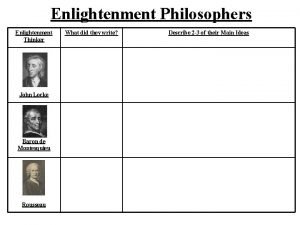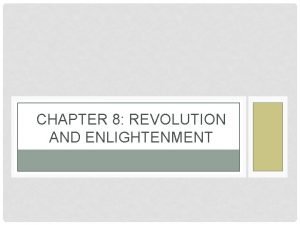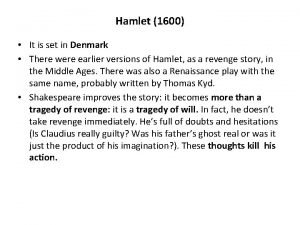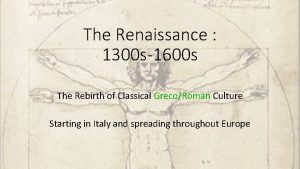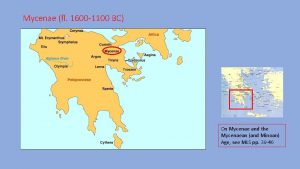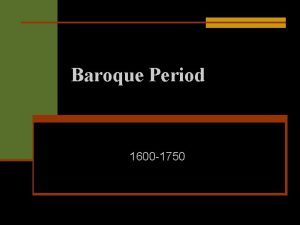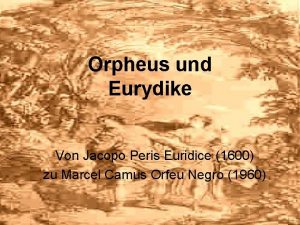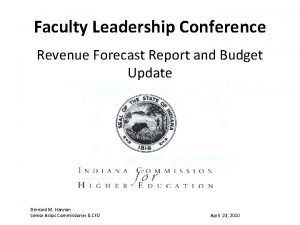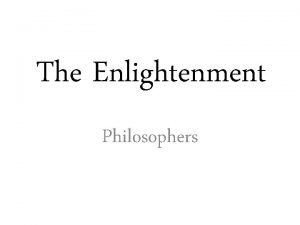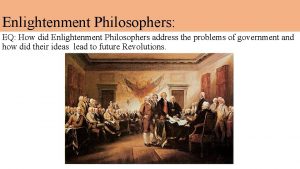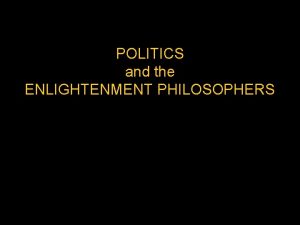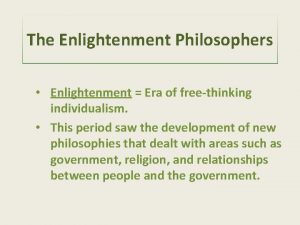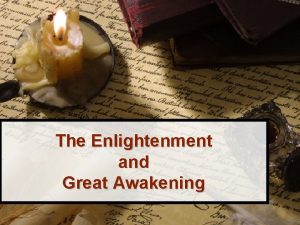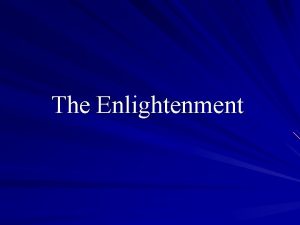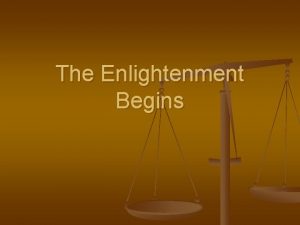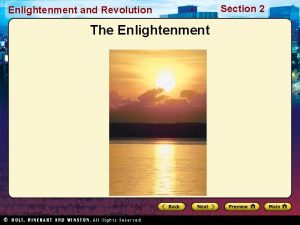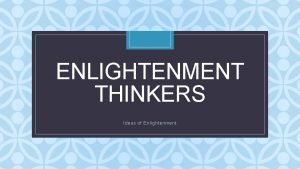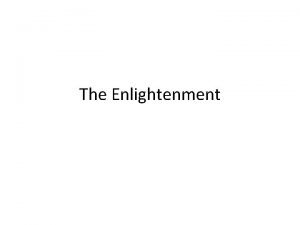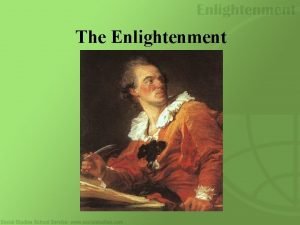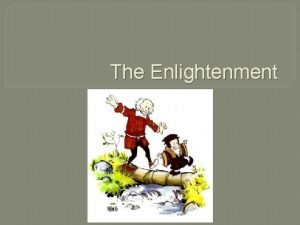Enlightenment Philosophers European Philosophers in the 1600 s














- Slides: 14

Enlightenment Philosophers European Philosophers in the 1600 s and 1700 s

Thomas Hobbes • 1588 -1679, English • Lived through the English Civil War (1642 -1651); this influenced many of his ideas • Human nature: people are naturally cruel, greedy, and selfish • The Leviathan (1621) was his most famous work.

The Leviathan • All men fear death and will do whatever necessary to prevent it, including killing others. • This keeps the world constantly in conflict and war – not in man’s best interest. • Social contract: an agreement by which people give up their freedom for an organized society and to prevent anarchy • Only a powerful government (absolute monarch) can ensure an orderly society where people do not continually kill others. This is in everyone’s best interest.

John Locke • 1632 -1704, English • People are basically reasonable and moral. • Wrote Two Treatises of Government (1690) • Wrote the Treatises to defend the Glorious Revolution of 1688 when William and Mary peacefully overtook the English throne from King James II

Two Treatises of Government • Labor is a natural right of man. Labor is the way men acquire property. This property is then a natural right to man as well. • Natural rights: rights that belong to all humans from birth including life, liberty, and property • People form governments to protect their natural rights. The best government is limited in power and accepted by all citizens (social contract). • Believed people were basically moral • Influence later seen in Declaration of Independence

Baron de Montesquieu • 1689 -1755, French • Greatly influenced by the success of the Glorious Revolution and the passing of the throne from powerful Louis XIV to weak Louis XV • Balanced view of people; they can be good and bad. • Wrote The Spirit of the Laws (1748)

Spirit of the Laws • Studied governments all of Europe, China, and Native American cultures • Three types of government: • Monarchies (principle of honor) • Republics (principle of virtue) • Despotism (principle of fear) • “Government should be set up so that no man need be afraid of another. " • Branches of government: legislative, executive, and judicial • Separating the powers of government is the best way to protect liberty for the people and keep government officials from fearing each other.

Voltaire • • • 1694 -1779, French • Most concerned with the right to a fair trial and freedom of religion Candide is his most famous work. Fought for civil rights: protections and privileges of personal power given to all citizens by the law of a government • • • Rejected the ancien régime (unfair balance of power among the three levels of society) for their hypocrisy and injustices Used sharp wit to criticize abuse by corrupt officials, aristocrats and clergy “I do not agree with a word you say, but I will defend to the death your right to say it. "

Denis Diderot • 1713 -1784, French • Had great confidence in the “lower classes”; all people have the ability to learn • Wrote Encyclopédie despite the intense controversy surrounding it • Government burned copies and Church threatened readers with excommunication

Encyclopédie • 28 volumes • Aristocracy disliked the because it • Included articles by Encyclopédie included ideas like religious leading Enlightenment thinkers tolerance and freedom of thought that undermined their authority. • His purpose was “to • Claimed that “the main change the general way of thinking” by explaining ideas of government, philosophy, and religion concern of the nation's government ought to be the nation's common people. ” • Denounced slavery • Pro free speech

Jean-Jacques Rousseau • 1712 -1778, French • Believed that people were basically good in the state of nature, but corrupted by society • Wrote The Social Contract • "Man is born free, and he is everywhere in chains. ”

The Social Contract • Society puts men in competition with one another but also makes them dependent on each other. • This problem can be overcome by a social contract: people give up some rights to a government to achieve order • General will: the best conscience of the people – the majority should always work toward the common goal • Individual should be subordinate to the community

Mary Wollstonecraft • According to male Enlightenment thinkers, women had limited natural rights • In A Vindication of the Rights of Women (1792), Mary Wollstonecraft proposed that even though women’s first duty was motherhood, they were not dependent on men • Argued girls should receive the same education as boys so that they could be on the same playing field.

Impact of the Enlightenment • People began to questions established beliefs and customs. • Encouraged changes to government which led to Revolutions in America, France, and Latin America • Many writers such as Voltaire were thrown into prison and their books were banned and burned. • Many church leaders defended the established system and censored those who taught new ideas. • Importance of the individual– promoted progress through reason and logic • Belief in progress through social equality and improvements in education
